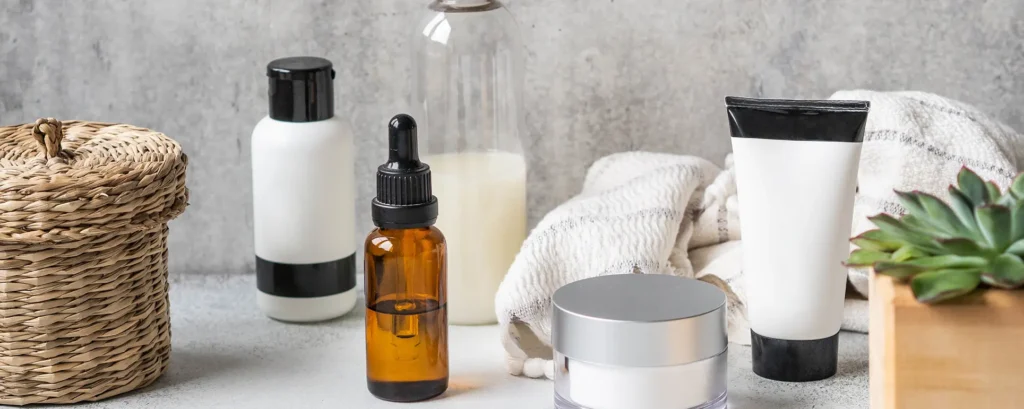Collagen has quickly become one of the biggest buzzwords in skincare, beauty, and even wellness. Walk into any pharmacy, health food shop, or beauty aisle, and you’ll find shelves stacked with collagen-packed products: face creams that claim to firm and smooth fine lines, powders you can mix into your morning smoothie, and capsules promising stronger hair, nails, and joints. Social media is equally saturated everywhere you scroll, there’s someone swearing by their daily scoop of collagen as the secret to a younger, fresher-looking complexion.
But with so many options and so much marketing it’s natural to wonder: are collagen creams and supplements genuinely effective, or are they simply the latest in a long line of beauty trends designed to sell hope in a bottle?
Here’s where things get interesting. Collagen isn’t just another trendy ingredient dreamt up by beauty brands. It’s actually the most abundant protein in your body, providing structure, strength, and elasticity to your skin, bones, muscles, and connective tissue. Think of it as the scaffolding that keeps everything firm and supported. The challenge is that our natural collagen production declines as we age, starting as early as our mid-20s and becoming more noticeable in our 30s and 40s. This gradual loss leads to sagging, wrinkles, and thinner skin changes most of us would prefer to slow down or prevent.
It’s no surprise, then, that collagen-based products are so appealing. The idea of simply applying a cream or drinking a supplement to “replace” what’s been lost feels convenient, accessible, and almost too good to be true. And that’s where the debate begins. While some studies suggest that collagen supplements may improve hydration and elasticity, other research points out that the benefits might be modest and highly individual. As for creams, many dermatologists argue that collagen molecules are too large to penetrate the skin deeply enough to make a dramatic difference.
So, should you spend your money on collagen creams and powders? Or would your time and budget be better invested in proven, dermatologist-recommended treatments? In this article, we’ll take a closer look at how collagen works, what the science really says about topical and oral products, and what skin experts recommend instead if you’re serious about maintaining youthful, healthy-looking skin.
What Is Collagen and Why Does It Matter?

When people talk about collagen in the context of beauty and skincare, they’re usually referring to its role in keeping skin smooth, firm, and youthful-looking. But collagen isn’t just a cosmetic protein. It’s actually the most abundant protein in the entire body, accounting for about one-third of your total protein content. Think of it as the glue that holds everything together without collagen, your skin would sag, your joints would weaken, and even simple functions like wound healing would become compromised.
Collagen forms a framework that supports your skin, muscles, tendons, ligaments, cartilage, and bones. In the skin, collagen fibres are woven into a tight, springy network that gives structure and elasticity. This is why a baby’s skin feels so soft and bouncy at that stage of life, collagen is plentiful and healthy. But as the years pass, that scaffolding gradually weakens and breaks down, leading to the visible signs of ageing.
Types of Collagen
It’s also worth noting that collagen isn’t just one thing there are at least 28 different types, but a few dominate when it comes to skin, hair, and joint health:
- Type I: The most common, making up over 90% of the collagen in your body. It provides structure to skin, bones, tendons, and connective tissue. When we talk about plump, youthful skin, Type I collagen is the star.
- Type II: Found mostly in cartilage, it cushions joints and helps with mobility. Many collagen supplements focus on this type to support joint health.
- Type III: Found in skin, blood vessels, and internal organs, often working alongside Type I to keep skin elastic and strong.
- Type IV and V: Less common, but important for forming cell membranes, hair, and the tissue that surrounds organs.
Different types of collagen matter because they explain why some products target beauty, while others are marketed for joints or general wellness. For example, marine collagen supplements are often promoted for skin and hair, while bovine collagen tends to be associated with both skin and joint support.
How Collagen Declines with Age
Collagen production isn’t steady throughout life. In your teens and early 20s, collagen is abundant, which is why skin looks naturally plump and firm. But by the time you reach your late 20s, your body begins to produce less dropping by about 1% per year. This decline might sound small, but over a decade, it becomes noticeable.
- By your 30s: Fine lines may appear, particularly around the eyes and mouth. Skin can start to look duller and less supple, and early loss of elasticity becomes more obvious.
- In your 40s: Wrinkles deepen, and skin often loses its firmness. This is also the stage when many people begin turning to anti-ageing products, fillers, or aesthetic treatments.
- By your 50s and beyond: Collagen loss accelerates, especially in women after menopause, when oestrogen levels drop. This can result in sagging skin, thinning hair, brittle nails, and more pronounced joint stiffness.
It’s not just ageing that reduces collagen, though. Lifestyle and environmental factors can damage collagen fibres or slow the body’s ability to replace them:
- Sun exposure (UV rays): Ultraviolet radiation is one of the leading causes of collagen breakdown, contributing to premature wrinkles and sagging.
- Smoking: Chemicals in cigarettes damage collagen and elastin, while reducing blood flow to the skin.
- High sugar diet: Excess sugar binds to proteins like collagen in a process called glycation, making fibres stiff and weak.
- Stress and lack of sleep: Both can interfere with collagen regeneration.
- Pollution: Environmental toxins contribute to oxidative stress, which accelerates collagen breakdown.
Why Collagen Matters for Skin, Hair, and Joints
Because collagen is involved in so many different systems, its decline shows up in multiple ways:
- Skin: Less collagen means less elasticity, more sagging, and the formation of wrinkles. Wound healing can also become slower.
- Hair: Collagen provides amino acids needed for hair strength. As levels decline, hair may become thinner or more brittle.
- Nails: Weak, peeling, or slow-growing nails are often linked to reduced collagen support.
- Joints: Lower collagen, especially Type II, means less cushioning for your joints, which can lead to stiffness or discomfort.
Understanding how collagen functions and what happens when it declines helps make sense of the products being marketed. A collagen cream that claims to “add collagen back into the skin” sounds tempting, but the science is more complicated. Likewise, supplements that promise stronger hair and firmer skin may offer some benefits, but they’re not a magic bullet.
Ultimately, collagen matters because it’s a key factor in both how we look and how we feel as we age. By grasping what it does and why we lose it, you’re better equipped to judge whether collagen creams and supplements are worth the investment or whether dermatologist-approved alternatives might be more effective.
Collagen Creams: Can They Really Work?

Collagen creams have become hugely popular in the skincare world, often promoted as products that can help restore youthful, firmer-looking skin. The idea sounds appealing apply collagen directly to your face and replenish what your body naturally loses with age. But how much of this is marketing, and how much is grounded in science? Dermatologists weigh in on what collagen creams can and can’t do.
Molecule size matters
One of the biggest limitations with collagen creams lies in the science of skin absorption. Collagen molecules are quite large, which means they are generally unable to penetrate into the deeper layers of the skin where natural collagen is produced and stored. Instead, they mostly remain on the surface. This doesn’t make them useless, but it does mean they won’t directly replace the collagen your body loses over time.
Hydration is the main benefit
What collagen creams do very well is improve hydration. By locking in moisture and providing a protective barrier, they can smooth out the skin’s surface, reduce the appearance of fine lines, and give skin a plumper, more refreshed look. This effect, while temporary, can make your complexion appear healthier and more youthful, especially if used consistently as part of a daily skincare routine.
Peptides in creams
Some collagen creams are formulated with peptides smaller protein fragments that can more easily penetrate the skin. Unlike full-sized collagen molecules, these peptides may act as messengers, signalling your skin to boost its own collagen production. While results are not instant, regular use of peptide-rich creams may help support skin firmness over time, though outcomes vary from person to person.
Bottom line
Collagen creams can certainly enhance skin hydration, improve surface texture, and contribute to a more youthful glow. However, they are not a substitute for the body’s natural collagen production, which inevitably declines with age. For deeper, long-lasting improvements in collagen levels, dermatologists often recommend treatments such as retinoids, microneedling, or laser therapy. In short, collagen creams are useful for surface-level benefits, but they won’t fully reverse the underlying process of collagen loss.
Collagen Supplements: Do They Deliver from Within?
In recent years, ingestible collagen supplements have surged in popularity, with powders, capsules, and even ready-to-drink formulas lining store shelves. Unlike creams that work only on the skin’s surface, these products claim to work from the inside out. But do they really deliver visible benefits? Dermatologists and researchers have begun to explore the science behind these supplements.
They provide building blocks for collagen
When you consume collagen supplements, your body breaks them down into amino acids and smaller peptides during digestion. These building blocks circulate through the bloodstream and can be used to support the body’s natural collagen-making process. While collagen itself doesn’t travel intact to your skin, providing these raw materials can give your system what it needs to produce new collagen fibres in the skin, joints, and other tissues.
What the research shows
Clinical studies though still relatively limited have found some encouraging results. Regular use of collagen supplements has been linked to modest improvements in skin elasticity, hydration, and firmness. Some participants also reported stronger nails and healthier-looking hair. These changes are not dramatic overnight transformations, but rather subtle enhancements that may become noticeable with consistent use over several weeks to months.
The role of diet and lifestyle
Dermatologists emphasise that collagen supplements work best when combined with an overall healthy lifestyle. Vitamin C, for example, is essential for collagen synthesis, so eating a diet rich in fruits and vegetables helps maximise results. On the flip side, habits like smoking and frequent unprotected sun exposure accelerate collagen breakdown, potentially undoing the benefits of supplementation. In other words, supplements may help, but they can’t outdo harmful daily habits.
Your body makes the final call
It’s also important to understand that collagen supplements provide only the raw materials. Your body ultimately decides how much new collagen it produces and where those amino acids are used. Some may go toward skin health, but others could support muscles, tendons, or other tissues in need. That’s why results can vary widely from person to person.
Bottom line
Collagen supplements can be a helpful addition to your routine, particularly if your goal is to support skin hydration and elasticity over time. However, they are not miracle fixes. Consistency, combined with a balanced diet and smart lifestyle choices, remains key for maintaining healthy, resilient skin.
Beyond Skin: Additional Potential Benefits
While collagen supplements are often marketed for their skin-enhancing effects, research and anecdotal reports suggest that their impact may go further. Scientists are still investigating, but here are some of the other areas where collagen could play a supportive role.
Joint comfort and mobility
Collagen is a major component of cartilage, the cushioning tissue that protects joints. As we age, natural collagen levels decline, which can contribute to stiffness and discomfort. Some studies indicate that collagen supplementation may help improve flexibility, reduce minor joint pain, and support overall mobility, particularly in people who are physically active or beginning to experience age-related joint changes.
Stronger hair and nails
Many users notice that collagen supplements don’t just affect their skin but also seem to improve the condition of hair and nails. Collagen provides amino acids that can strengthen the keratin structure, potentially reducing nail brittleness and promoting faster growth. For hair, it may help reduce thinning and support thickness, although evidence is still limited.
Gut health support
Collagen also contains amino acids like glycine and glutamine, which may play a role in maintaining the integrity of the intestinal lining. This has led to growing interest in collagen’s potential to support gut health. While the research is still emerging, some nutrition experts believe that supplementation could contribute to digestive comfort and better nutrient absorption.
The evidence so far
Although these potential benefits are promising, results can vary widely between individuals. Clinical research is still ongoing, and more robust, long-term studies are needed to fully confirm collagen’s effectiveness beyond skin health. For now, it’s best to view these additional benefits as possible “extras” rather than guaranteed outcomes.
Dermatologist-Recommended Anti-Ageing Strategies
Collagen creams and supplements can play a role in a skincare routine, but dermatologists emphasise that they are only part of the bigger picture. If your goal is to slow down visible ageing and support long-term skin health, proven approaches often work more effectively than relying on collagen products alone. Here are some of the strategies experts frequently recommend.
Topical retinoids and vitamin C
Retinoids (vitamin A derivatives) are considered one of the gold standards in anti-ageing skincare. They stimulate the skin’s natural collagen production, accelerate cell turnover, and improve texture and tone over time. Similarly, topical vitamin C is a powerful antioxidant that not only protects against free radical damage but also promotes collagen synthesis, helping to firm the skin and brighten overall complexion.
Daily sunscreen use
Sun exposure is one of the leading causes of premature ageing, as UV rays break down collagen fibres in the skin. Applying a broad-spectrum sunscreen with SPF 30 or higher every day is one of the simplest and most effective ways to preserve collagen levels. Consistency matters using sunscreen even on cloudy days or when indoors near windows helps minimise UV-induced damage.
Balanced diet and proper hydration
Your skin reflects what you put into your body. A diet rich in fruits, vegetables, lean proteins, and healthy fats provides essential nutrients for collagen production and repair. Vitamin C, zinc, and copper are particularly important for collagen synthesis. Staying well-hydrated also helps maintain skin elasticity and a plump, healthy look.
Professional in-clinic treatments
For those seeking more intensive results, dermatologists often recommend professional treatments. Laser therapy can resurface the skin and stimulate new collagen formation. Microneedling creates controlled micro-injuries that prompt collagen production during the healing process. Chemical peels, depending on their strength, can improve skin texture, reduce pigmentation, and encourage collagen renewal. These options tend to deliver noticeable improvements when performed under expert supervision.
The takeaway
While collagen creams and supplements have their place, combining them with dermatologist-recommended strategies is far more effective for long-term anti-ageing results. By protecting existing collagen, stimulating new growth, and maintaining a healthy lifestyle, you can support stronger, more resilient skin as the years go by.
Final Thought: What Really Works for Ageing Skin
Collagen creams and supplements can offer mild benefits, mainly for hydration and skin texture. They aren’t miracle solutions for aging skin. For a tailored anti-ageing plan that actually works, consult a Dermatologist in London, who can guide you toward effective treatments and products suited to your skin type.
References:
- Bruyère, O., Zegels, B., Leonori, L., Rabenda, V., Janssen, A., Bourges, C. & Reginster, J.-Y. (2012). Effect of collagen hydrolysate in articular pain: a 6-month randomised, double-blind, placebo-controlled study. Complementary Therapies in Medicine, 20(3), pp.124–130. doi:10.1016/j.ctim.2011.12.007.
Available at: https://pubmed.ncbi.nlm.nih.gov/22500661/ - Moskowitz, R.W. (2000). Role of collagen hydrolysate in bone and joint disease. Seminars in Arthritis and Rheumatism, 30(2), pp.87–99.
Available at: https://pubmed.ncbi.nlm.nih.gov/11071580/ - Zdzieblik, D., Brame, J., Oesser, S., Gollhofer, A. & König, D. (2021). The influence of specific bioactive collagen peptides on knee joint discomfort in young physically active adults: a randomized controlled trial. Nutrients, 13(2), 523.
Available at: https://pmc.ncbi.nlm.nih.gov/articles/PMC7915677/ - Bello, A.E. & Oesser, S. (2006). Collagen hydrolysate for the treatment of osteoarthritis and other joint disorders: a review of the literature. Current Medical Research and Opinion, 22(11), pp.2221–2232.
Available at: https://pubmed.ncbi.nlm.nih.gov/17076983/ - Zhang, C., Li, S., Xiong, W., Wu, H. & Chen, W. (2023). Analgesic efficacy of collagen peptide in knee osteoarthritis: a meta-analysis of randomized controlled trials. Journal of Orthopaedic Surgery and Research, 18, 694.
Available at: https://josr-online.biomedcentral.com/articles/10.1186/s13018-023-04182-w
